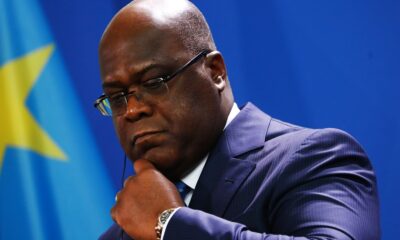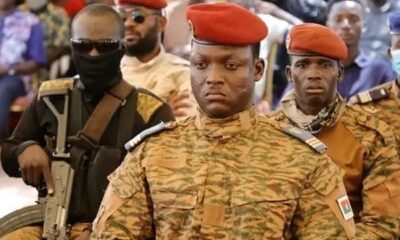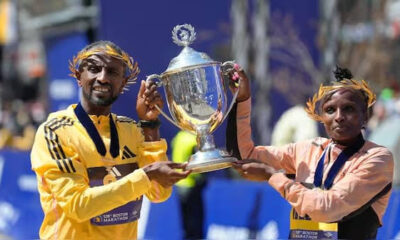Strictly Personal
Russia-Ukraine Conflict: A discussion from the African desert, By Isaac Mwanza
Published
1 year agoon

“Africa Is not for Sale. Africa is open for business not for sale or looting. We must defend what is ours and make sure that no one takes from us what is ours,” ~ Malawian President Lazarus Chakwera
INTRODUCTION
It was a bright summer Tuesday in the Khomas Highland plateau, Windhoek. As the cool breeze from the rising water levels in the Orange River swept across a city with extraordinarily rich fauna, leaders from the Southern African Development Community (SADC) organ on peace and security gathered on 31 January 2023 to deliberate the political and security situation in the region. While at it, they reiterate the earlier SADC position against the coercive behaviour of the United States of America to use its aid power to hold them at ransom over the ongoing conflict between Russia and Ukraine.
REACTION TO U.S. LAW ON AFRICA
On 27 April 2022, the U.S. House of Representatives enacted the “Countering Malign Russian Activities in Africa Act” which, once passed by the Senate, would effectively punish African governments and nationals who work with Russia amid the war in Ukraine.
The law specifically targets Africa in what the U.S. claims to be a law to counter “malign Russian influence and activities” and states its objectives as including “holding African governments and their officials accountable for aiding Russia’s malign influence and activities in Africa.”
The bigger question is why has America decided to enact a law targeting trade relations between Africa and Russia and not make the same law on trade relations between China and Russia. Is it because our African leaders are pawns in this game?
It can be inferred from the decision to enact this law that the Joe Biden administration intends to use its mighty power to force African nations to choose between the USA and the Russian Federation.
That is a glaring expression of the worst form of colonial and imperial arrogance as well as a jurisdictional overreach by the leader of the Western alliance.
The law has been opposed by Africa’s regional bodies such as SADC as it seeks to unduly influence foreign policies and trade relations by African countries who either support or refuse to denounce Russia in its conflict with Ukraine.
The African Union is taking a firm and conscientious position of non-alignment to the Russia-Ukraine conflict.
For close to a century now, African countries that had been freed from the bondage of European colonialism enjoy strong ties with both mega powers, namely, the USA and the Soviet Union which, after the monumental changes of 1989, reverted to its former status as the Russian Federation.
But America is now attempting to dictate to the developing world, Africa in particular, and to the rest of the world at large, that this must change.
Having failed to persuade the world of its noble intentions, the Biden administration is now resorting to economic and military coercion in an attempt to bring about the global political realignment that the U.S. seeks, and which it hopes, will allow it to remain the dominant economic power that it has been since the end of World War II and the resulting economic order.
The Biden administration has placed its hands on foreign aid and sanctions as weapons which they will use, together with its NATO allies, to beat Africa into submission and to crush Africa’s collective sovereign will.
But this pattern by America’s leaders – both Republicans and Democrats – is becoming predictable.
In an address to a joint session of Congress on 20 September 2001, former U.S. President George W. Bush, Jr., superciliously declared, “Every nation, in every region, now has the decision to make. Either you are with us, or you are with the terrorists.”
President Bush went on to brand the three countries opposed to U.S. foreign policy — North Korea, Iran, and Iraq — as rogue states, “the axis of evil” whom he alleged, had harboured, financed, and aided terrorists even though no citizen of these States had ever attacked the U.S.
None of these countries were involved in terrorist attacks on New York and Washington D.C. on 11 September 2001.
President Bush could be forgiven because Republicans are quite well known for bullying other nations and for war-mongering.
But the U.S. Democratic Party has always been seen as being more friendly towards Africa, especially during the term of its previous Democratic President, Barack Obama.
It is, therefore, a very surprising development, that the Democratic administration of President Biden, would single out Africa, which also shares longstanding ties to Russia, for punishment under this rather ridiculous law that ostensibly seeks to counter Russian malign influence in Africa.
The decision to enact the law on Africa is ridiculous as it defeats the very idea of national sovereignty which President Biden purports to be defending on behalf of Ukraine.
It can be inferred that this U.S. law on Africa will require African States to surrender their sovereignty in defending the sovereignty of Ukraine. Do Joe Biden and his colleagues in Congress think that African leaders and we in Africa’s sovereign States are subject to America’s will?
Unfortunately for President Biden, Africa, and its people may not share the goals which his administration, NATO, and western allies may have set for Ukraine.
Africa is aware that Russia has genuine security concerns about the adversarial NATO alliance establishing itself on Russia’s south-western border, just as Africa was concerned when the former Soviet Union and its Warsaw Pact allies, attempted to establish military bases on America’s south-eastern coast on the island of Cuba in the 1962 Cuba missile crisis.
Going by previous history of similar military adventurism, Africa has its own misgivings about the U.S. hegemony, as shown in previous articles, which showed that America had been on a similar path in Cuba, Grenada and more recently in Venezuela.
In the Middle East, the U.S. threatens and erodes the sovereignty of the Arab nations by providing billions of dollars in military and other aid to Israel which then acts as an enforcer of U.S. hegemonic policies, suppressing Arab states while ensuring that the Palestinian people do not and cannot achieve the sovereign status of a nation.
The U.S. has subtly blocked every attempt by the Palestinians to achieve sovereign nationhood and has used Israel to keep the Palestinian people under bondage while making a big show of its desire for all people to fully enjoy their human rights, self-determination, and sovereign status.
The U.S. and EU’s coercive, patronizing, and bullying behaviours regarding Africa’s position toward the war in Ukraine, show utter disrespect for our African countries as sovereign nations who have the capacity to make sovereign decisions.
It goes without saying, that sovereign nations get to decide who they are going to associate with or not; that is an issue of international law, state policies, and principles. America is wrong to use its domestic law as if somehow, the U.S. has universal legal jurisdiction.
It is also unacceptable that the U.S. should use its aid which, ostensibly, is intended to assist recipient poor countries in their development as a weapon of foreign policy, preying on the dependence our African leaders have on such aid in achieving their national development goals.
It is morally wrong for the U.S. to subvert African nations’ home-grown solutions by forcing them to take a position with the U.S. and its NATO allies, over Russia or gagging trade relations between sovereign States.
If the U.S. and its NATO allies were genuine about allowing sovereign nations to decide for themselves who to associate with, they should have applauded our position of non-alignment than coercing African countries by threatening them, using a new law, with punishments for trading with Russia.
It is therefore noble that we must commend their Excellencies, Zambian President Hakainde Hichilema, South African President Cyril Ramaphosa, and Namibian President, Dr. Hage Geingob, leaders of Eswatini and Lesotho as well as ministers from the Democratic Republic of Congo and Mozambique for being loud and clear in endorsing the AU position of non-alignment in conflicts outside the continent and against the U.S. law on Africa.
But it is now important for President Hichilema and other individual African leaders to personally come out and defend their position on this questionable U.S. law than hide behind collective decisions made in boardrooms.
CONCLUSION
The U.S. is known for promoting people’s self-government, free will, and choices. It is a leader in that area. Many of us are attracted to the United States of America because of its founding ideals of life, liberty, and the pursuit of happiness it has espoused over two centuries.
It is therefore not in the best interest of America to dictate how Africa must make its decisions. Africa must trade with anyone it desires, including the U.S., Russia, and China – all of them having been Africa’s all-weather friends.
The coercive and bullying behaviour to stop Africa and its people from deciding on their own, whether to trade or even side with Russia, is an infringement on the sovereignty of individual States and a subversion of the collective will of the African peoples.
It is even more disturbing that the US House of Representatives would go so far as to threaten punishment for disobeying America’s foreign policy dictates. Probably, this is being done upon realisation by the West that African leaders cannot do without foreign aid, and they value aid as a panacea to their prolonged stay in power and developing Africa.
You may like
-


Air Peace, capitalism and national interest, By Dakuku Peterside
-


This is chaos, not governance, and we must stop it, By Tee Ngugi
-


Off we go again with public shows, humbug and clowning, By Jenerali Uliwengu
-


How patriarchy underpins gender violence today, By Tee Ngugi
-


Help! There’s a dangerous, secret plot to save the EAC from imminent death, By Charles Onyango-Obbo
-


How South Africa, US elections could shape Tshisekedi’s bread in Kinshasa, By Charles Onyango-Obbo
Strictly Personal
Air Peace, capitalism and national interest, By Dakuku Peterside
Published
3 days agoon
April 16, 2024
Nigerian corporate influence and that of the West continue to collide. The rationale is straightforward: whereas corporate activity in Europe and America is part of their larger local and foreign policy engagement, privately owned enterprises in Nigeria or commercial interests are not part of Nigeria’s foreign policy ecosystem, neither is there a strong culture of government support for privately owned enterprises’ expansion locally and internationally.
The relationship between Nigerian businesses and foreign policy is important to the national interest. When backing domestic Nigerian companies to compete on a worldwide scale, the government should see it as a lever to drive foreign policy, and national strategic interest, promote trade, enhance national security considerations, and minimize distortion in the domestic market as the foreign airlines were doing, boost GDP, create employment opportunities, and optimize corporate returns for the firms.
Admitted nations do not always interfere directly in their companies’ business and commercial dealings, and there are always exceptions. I can cite two areas of exception: military sales by companies because of their strategic implications and are, therefore, part of foreign and diplomatic policy and processes. The second is where the products or routes of a company have implications for foreign policy. Air Peace falls into the second category in the Lagos – London route.
Two events demonstrate an emerging trend that, if not checked, will disincentivize Nigerian firms from competing in the global marketplace. There are other notable examples, but I am using these two examples because they are very recent and ongoing, and they are typological representations of the need for Nigerian government backing and support for local companies that are playing in a very competitive international market dominated by big foreign companies whose governments are using all forms of foreign policies and diplomacy to support and sustain.
The first is Air Peace. It is the only Nigerian-owned aviation company playing globally and checkmating the dominance of foreign airlines. The most recent advance is the commencement of flights on the Lagos – London route. In Nigeria, foreign airlines are well-established and accustomed to a lack of rivalry, yet a free-market economy depends on the existence of competition. Nigeria has significantly larger airline profits per passenger than other comparable African nations. Insufficient competition has resulted in high ticket costs and poor service quality. It is precisely this jinx that Air Peace is attempting to break.
On March 30, 2024, Air Peace reciprocated the lopsided Bilateral Air Service Agreement, BASA, between Nigeria and the United Kingdom when the local airline began direct flight operations from Lagos to Gatwick Airport in London. This elicited several reactions from foreign airlines backed by their various sovereigns because of their strategic interest. A critical response is the commencement of a price war. Before the Air Peace entry, the price of international flight tickets on the Lagos-London route had soared to as much as N3.5 million for the economy ticket. However, after Air Peace introduced a return economy class ticket priced at N1.2 million, foreign carriers like British Airways, Virgin Atlantic, and Qatar Airways reduced their fares significantly to remain competitive.
In a price war, there is little the government can do. In an open-market competitive situation such as this, our government must not act in a manner that suggests it is antagonistic to foreign players and competitors. There must be an appearance of a level playing field. However, government owes Air Peace protection against foreign competitors backed by their home governments. This is in the overall interest of the Nigerian consumer of goods and services. Competition history in the airspace works where the Consumer Protection Authority in the host country is active. This is almost absent in Nigeria and it is a reason why foreign airlines have been arbitrary in pricing their tickets. Nigerian consumers are often at the mercy of these foreign firms who lack any vista of patriotism and are more inclined to protect the national interest of their governments and countries.
It would not be too much to expect Nigerian companies playing globally to benefit from the protection of the Nigerian government to limit influence peddling by foreign-owned companies. The success of Air Peace should enable a more competitive and sustainable market, allowing domestic players to grow their network and propel Nigeria to the forefront of international aviation.
The second is Proforce, a Nigerian-owned military hardware manufacturing firm active in Rwanda, Chad, Mali, Ghana, Niger, Burkina Faso, and South Sudan. Despite the growing capacity of Proforce in military hardware manufacturing, Nigeria entered two lopsided arrangements with two UAE firms to supply military equipment worth billions of dollars , respectively. Both deals are backed by the UAE government but executed by UAE firms.
These deals on a more extensive web are not unconnected with UAE’s national strategic interest. In pursuit of its strategic national interest, India is pushing Indian firms to supply military equipment to Nigeria. The Nigerian defence equipment market has seen weaker indigenous competitors driven out due to the combination of local manufacturers’ lack of competitive capacity and government patronage of Asian, European, and US firms in the defence equipment manufacturing sector. This is a misnomer and needs to be corrected.
Not only should our government be the primary customer of this firm if its products meet international standards, but it should also support and protect it from the harsh competitive realities of a challenging but strategic market directly linked to our national military procurement ecosystem. The ability to produce military hardware locally is significant to our defence strategy.
This firm and similar companies playing in this strategic defence area must be considered strategic and have a considerable place in Nigeria’s foreign policy calculations. Protecting Nigeria’s interests is the primary reason for our engagement in global diplomacy. The government must deliberately balance national interest with capacity and competence in military hardware purchases. It will not be too much to ask these foreign firms to partner with local companies so we can embed the technology transfer advantages.
Our government must create an environment that enables our local companies to compete globally and ply their trades in various countries. It should be part of the government’s overall economic, strategic growth agenda to identify areas or sectors in which Nigerian companies have a competitive advantage, especially in the sub-region and across Africa and support the companies in these sectors to advance and grow to dominate in the African region with a view to competing globally. Government support in the form of incentives such as competitive grants ,tax credit for consumers ,low-interest capital, patronage, G2G business, operational support, and diplomatic lobbying, amongst others, will alter the competitive landscape. Governments and key government agencies in the west retain the services of lobbying firms in pursuit of its strategic interest.
Nigerian firms’ competitiveness on a global scale can only be enhanced by the support of the Nigerian government. Foreign policy interests should be a key driver of Nigerian trade agreements. How does the Nigerian government support private companies to grow and compete globally? Is it intentionally mapping out growth areas and creating opportunities for Nigerian firms to maximize their potential? Is the government at the domestic level removing bottlenecks and impediments to private company growth, allowing a level playing field for these companies to compete with international companies?
Why is the government patronising foreign firms against local firms if their products are of similar value? Why are Nigerian consumers left to the hands of international companies in some sectors without the government actively supporting the growth of local firms to compete in those sectors? These questions merit honest answers. Nigerian national interest must be the driving factor for our foreign policies, which must cover the private sector, just as is the case with most developed countries. The new global capitalism is not a product of accident or chance; the government has choreographed and shaped it by using foreign policies to support and protect local firms competing globally. Nigeria must learn to do the same to build a strong economy with more jobs.
Strictly Personal
This is chaos, not governance, and we must stop it, By Tee Ngugi
Published
1 week agoon
April 10, 2024
The following are stories that have dominated mainstream media in recent times. Fake fertiliser and attempts by powerful politicians to kill the story. A nation of bribes, government ministries and corporations where the vice is so routine that it has the semblance of policy. Irregular spending of billions in Nairobi County.
Billions are spent in all countries on domestic and foreign travel. Grabbing of land belonging to state corporations, was a scam reminiscent of the Kanu era when even public toilets would be grabbed. Crisis in the health and education sectors.
Tribalism in hiring for state jobs. Return of construction in riparian lands and natural waterways. Relocation of major businesses because of high cost of power and heavy taxation. A tax regime that is so punitive, it squeezes life out of small businesses. Etc, ad nauseam.
To be fair, these stories of thievery, mismanagement, negligence, incompetence and greed have been present in all administrations since independence.
However, instead of the cynically-named “mama mboga” government reversing this gradual slide towards state failure, it is fuelling it.
Alternately, it’s campaigning for 2027 or gallivanting all over the world, evoking the legend of Emperor Nero playing the violin as Rome burned.
A government is run based on strict adherence to policies and laws. It appoints the most competent personnel, irrespective of tribe, to run efficient departments which have clear-cut goals.
It aligns education to its national vision. Its strategies to achieve food security should be driven by the best brains and guided by innovative policies. It enacts policies that attract investment and incentivize building of businesses. It treats any kind of thievery or negligence as sabotage.
Government is not a political party. Government officials should have nothing to do with political party matters. They should be so engaged in their government duties that they literally would not have time for party issues. Government jobs should not be used to reward girlfriends and cronies.
Government is exhausting work undertaken because of a passion to transform lives, not for the trappings of power. Government is not endless campaigning to win the next election. To his credit, Mwai Kibaki left party matters alone until he had to run for re-election.
We have corrupted the meaning of government. We have parliamentarians beholden to their tribes, not to ideas.
We have incompetent and corrupt judges. We have a civil service where you bribe to be served. Police take bribes to allow death traps on our roads. We have urban planners who plan nothing except how to line their pockets. We have regulatory agencies that regulate nothing, including the intake of their fat stomachs.
We have advisers who advise on which tenders should go to whom. There is no central organising ethos at the heart of government. There is no sense of national purpose. We have flurries of national activities, policies, legislation, appointments which don’t lead to meaningful growth. We just run on the same spot.
Tee Ngugi is a Nairobi-based political commentator
EDITOR’S PICK


‘Reconsider your anti-people policies, they are causing hardship, insecurity in Nigeria’— PDP tells Tinubu
Nigeria’s main opposition party, the Peoples Democratic Party (PDP), has called on President Bola Tinubu to consider what it calls...


Top European, Asian clubs on alert as Super Eagles keeper set to make contract decision
Some top clubs in Europe and Asia have been put on alert as Super Eagles and Chippa United goalkeeper, Stanley...


IMF says South Africa needs to do more to cut spending, lower debt-to-GDP ratio
A top official from the International Monetary Fund has revealed that South Africa needs to do more to cut spending...


Burkina Faso expels 3 French diplomats over ‘subversive activities’
According to a letter quoted by Reuters on Thursday, three French diplomats have been sent back to France by Burkina...


Nigeria’s MAX partners Ghana’s Kofa in e-bike financing deal
Nigeria’s electric vehicle solutions provider, MAX, has announced striking a partnership deal with Ghana’s innovator in energy networks, Kofa, that...


Zambia asks EU to help strengthen its democratic initiatives ahead of 2026 elections
The Zambian government has called on the European Union (EU) to help in strengthening democratic initiatives in the country as...


Nigeria destined to become major global economy under Tinubu— VP Shettima
Nigeria’s Vice President, Kashim Shettima, has predicted that the country is destined to become a major economic force in the...


Nigeria’s central bank insists depleting external reserves not due to Naira defence
According to the Central Bank of Nigeria (CBN), the big drop in the country’s foreign exchange reserves was not due...


African Guarantee Fund partners Nordic Development Fund to launch green finance in Nigeria
The African Guarantee Fund (AGF) has teamed up with the Nordic Development Fund (NDF) to launch a green finance fund...


Ethiopia’s Lemma, Kenya’s Obiri give Africa double podium finish at Boston Marathon
Ethiopia’s long distance runner, Sisay Lemma, and Kenyan female marathon sensation, Hellen Obiri, teamed up to give Africa a double...
Trending
-

 Tech1 day ago
Tech1 day agoNigeria’s MAX partners Ghana’s Kofa in e-bike financing deal
-

 Metro1 day ago
Metro1 day agoNigeria destined to become major global economy under Tinubu— VP Shettima
-

 Sports1 day ago
Sports1 day agoTop European, Asian clubs on alert as Super Eagles keeper set to make contract decision
-

 VenturesNow1 day ago
VenturesNow1 day agoNigeria’s central bank insists depleting external reserves not due to Naira defence


